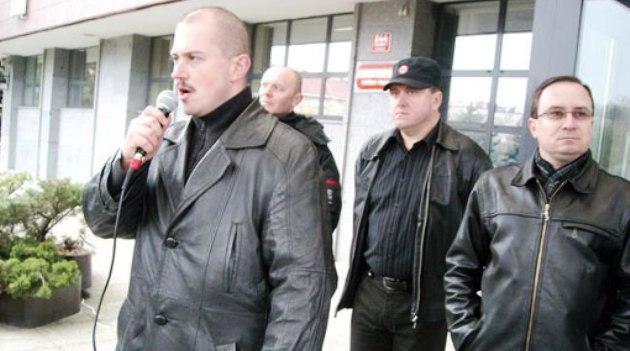Several years ago he denied the Holocaust, called the Slovak National Uprising a communist putsch, and used the wartime-era Hlinka Guard greeting "On duty!" (Na Stráž!) at a demonstration. His party’s program promises to turn things around with "Romani and other parasites."
Who is he? Marian Kotleba, the 40-year-old leader of the People’s Party "Our Slovakia" (Lidová strana naše Slovensko – LSNS) and the erstwhile leader of Slovak Solidarity (Slovenská pospolitost), a party that has been banned by the courts.
From a noisy speech-giver at rallies who loves uniforms, he has now risen to the position of a politician whom Slovakia must start taking seriously. In last weekend’s regional elections, Kotleba recorded an unexpected success.
In the Banská Bystrica Region Kotleba received more than 26 000 votes in the election for governor, ending up in second place. Because the winning candidate from the governing party Směr, Vladimír Maňka, did not win more than half of the votes cast, Kotleba has made it into the second round of voting.
Few people anticipated this might happen. The result in the Banská Bystrica Region is a shock primarily for the right-wing parties.
Ludovít Kaník, candidate for the Slovak Democratic and Christian Union – Democratic Party (SDKU-DS), ended up in third place behind Kotleba. Through his anti-Romani rhetoric and criticism of past governments for not addressing unemployment, Kotleba won over the region’s dissatisfied, frustrated voters.
He also won over those who see Romani people as the enemy and a threat. His party’s program includes, for example, creating militias, removing Slovakia from the "terrorist NATO pact", establishing social justice, eliminating "privileges, and not just for gypsy parasites", and rejecting "the promotion of sexual perverts".
Slovak daily Sme has reported that Kotleba paradoxically received the most votes in Čierny Balog, a community with few Romani residents and no reported problems between them and the majority population. Another paradox is that Kotleba, who espouses the legacy of Tiso’s WWII-era Slovak state, also received great support from the village of Nemecká not far from the town of Brezno, which features a big monument to the victims of Fascism.
At the start of 1945, the Nazis executed hundreds of people and burned their bodies at a lime kiln in Nemecká. "Young people do not perceive Kotleba as a neo-Fascist, but as someone who tells them what they need to hear. He is exploiting the system’s deficiencies and the fact that young people don’t have anyone else to vote for," Stanislav Mičev, director of the Museum of the Slovak National Uprising in Banská Bystrica, was quoted by Sme as saying.
The second round of voting will take place on Saturday, 23 November. Some analysts see the fatal flaw as being that the former Slovak Labor Minister in the right-wing government, Iveta Radičová, is perceived exceptionally negatively in the region, which has enormous unemployment and the worst social situation in the country.
The radical’s success has brought together the left-wing Směr party of Slovak PM Robert Fico and his right-wing rivals. Defeated candidate Kaník has recommended his voters cast their ballots for the Směr candidate, Maňka, in the second round of voting.
"This is a problem for everyone, for all of society. That’s why Kaník responded as he did. He was disappointed, shocked, unpleasantly surprised, but there was nothing else he could do unless he and the SDKU-DS wanted to lose face," political scientist Tomáš Koziak told the online daily Aktuálne.sk.
The Most-Híd party is also supporting Maňka now, as are ethnic Hungarian voters in Banská Bystrica Region whom Aktuálne.sk reports would never have voted for a Slovak nationalist like Kotleba in the first place. The politician was working as a computer science teacher at the Eight-Year Athletic Preparatory School in Banská Bystrica when he founded the Slovak Solidarity party (Slovenská pospolitost) back in 2003.
The Slovak Supreme Court ordered the party dissolved three years later because it posed a threat to democracy and violated the Slovak Constitution. Kotleba then established the LSNS.
In last year’s parliamentary elections the party received 1.58 % of the vote. Kotleba also founded the "Clean and Use" movement (Uklízet a užívat), whose members have become the owners of land on which Romani settlements have been built.
